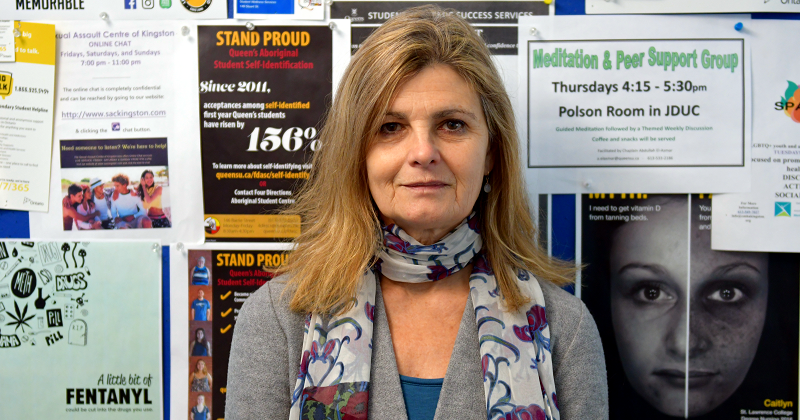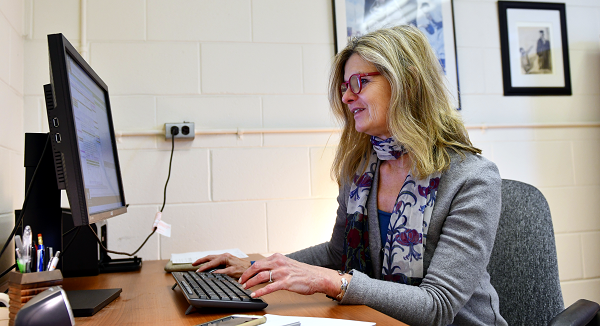Introducing our new faculty members: Anne Duffy
March 29, 2018
Share
This profile is part of a series highlighting some of the new faculty members who have recently joined the Queen's community as part of the principal's faculty renewal plans, which will see 200 new faculty members hired over the next five years.
Anne Duffy (Psychiatry) sat down with the Gazette to talk about her experience so far. Dr. Duffy is a clinician-researcher who is funded by the Canadian Institutes of Health Research (CIHR) to continue a two-decades-long study of young people at familial risk of developing mood disorders.
In addition to research, she sees students in psychiatry consultation at Student Wellness Services and helps with some of the clinical teaching for undergraduate medical students and psychiatry residents (graduate level and specialty level). Dr. Duffy is also the current vice president of research for the International Society of Bipolar Disorders.

Fast facts about Dr. Duffy
Department: Psychiatry
Hometown: Toronto
Alma mater: University of Victoria (neuropsychology), University of Calgary (medicine), University of Ottawa (psychiatry residency)
Research area: Youth mental health
Unwinds with: Spin classes, yoga, down-hill skiing, and laughter
- What made you decide to make the move to Kingston?
- I have had a two decades-long research project with families living between Ottawa and Toronto. Queen's is geographically well-suited to support this study and the Department of Psychiatry has provided protected time for me to dedicate to this work. With these advantages, I can consolidate my effort with these families and really move this world-renowned research forward.
- In addition, Queen’s Faculty of Health Sciences and Department of Psychiatry have made student mental health a priority. I am well-placed to help advance research and best practice to improve the health and academic outcomes for students. So, I thought the position at Queen’s was a good fit and an exciting opportunity.
- Tell us about this two-decades-long research project.
- During residency training in Ottawa, in my research elective, I worked with faculty in the Department of Psychiatry who were conducting genetic studies in families trying to identify the genetic underpinnings of recurrent major depression and bipolar disorder.
- Genetic studies were focused on adults who had already progressed through the risk period. Yet, as a training adolescent psychiatrist, my interest was in describing the early developmental course and onset of illness. Questions arose in my mind including: Are there any early antecedents and precursors we could pick up before the full-blown illness develops?
- This was the start of the Canadian ‘high-risk study’ – a first in the field for research of children of bipolar parents. Bipolar disorder is a highly-heritable form of recurrent mood disorder with a high suicide risk.
- When the study started, 22 years ago, I thought I would be staying in Ottawa for a year or two and then head back out west, where I completed medical school. I ended up staying and developing the research further as it was so fascinating and informative.
- The project has been a huge success in terms of offering a collaborative multidisciplinary training platform for new, young researchers and graduate students. As a physician, the research has taught us a lot about how to recognize these illnesses earlier on.
- It has also generated a whole other set of research questions. So, we have just been funded again for an additional five years of peer-reviewed, competitive funding.
- We are still interested in looking at epigenetic markers – which is the idea that we are born with our genes, and the function of our genes changes over time and with exposure. We are also working with people in public health, epidemiology, and mathematics to do modelling work so we can mitigate and target the risk exposures in these at-risk kids.
- I regularly go abroad to talk about this Canadian grassroots study. It has been really well-received and addressed a number of unknowns and controversies in the field.
- So what’s the next step?
- I have just led a successful CIHR Strategy for Patient-Oriented Research grant – the first of its kind to my knowledge in student mental health at Queen’s. It involves a number of faculty and trainees across departments including Psychology, Public Health Sciences, and Student Wellness Services. The grant received matching funds from the Rossy Family Foundation, and it will be conducted in collaboration with my colleagues in the Department of Psychiatry at Oxford University.
- This study will examine how we can support students to be academically successful, while also establishing a healthy lifestyle and maintaining their mental health. We are looking to answer why some first-year students flourish while others do not – that’s a huge question. I have spent two decades looking at risk for illness – now I am moving into resiliency, risk mitigation, and student health.
It has been a great way to start at Queen’s. It has allowed me to meet my colleagues across disciplines and to work with them, and to really pioneer student mental health research which can be informed by the more specific psychiatric research that I have been doing.
-Dr. Anne Duffy on a new research project starting this fall
- What got you interested in the topic of mental health in children? In youth?
- I had applied to train in pediatrics as a specialist originally, but I was terrible in my pediatrics rotations because I was an asthmatic and always getting sick, which would exacerbate my breathing troubles. Yet, being an asthmatic is what originally got me interested in medicine in the first place.
- I also found it difficult to do procedures on children – like stitching them up or cutting them open. What I was good at, however, was talking with children and families, so I decided to go into adolescent psychiatry.
- Very little was known at the time about the early signs and symptoms of psychiatric illness in children, and so it was a wide-open field for clinical research. It was a perfect marriage of interest, opportunity, and skill set.
- To me, adolescence is the most interesting period of time in development. There is so much changing at such a rapid rate. Plus, if you can get in there and help young people, you set them on a trajectory for lifelong happiness and success.

- What do you find most rewarding about your work?
- I love helping people. That is why you get into helping professions. Even if I am tired, I am happy to be here because a student is going to come through the door who is distressed, and I can potentially make a difference for that student.
- I also have the opportunity to train and mentor fantastic students. Graduate students across disciplines are so stimulating and make the work so much better than it would be if I was doing it on my own. It’s a huge privilege to be practicing medicine and to be in part of the university campus. I have always been incredibly grateful for that opportunity.
- Your resume suggests you like to travel. Any places you want to see in particular?
- You might know by my name that I have an Irish background. My father was Irish but he grew up in Scotland. I grew up knowing my Scottish family, but I have never actually been to Ireland or learned about my own Irish roots.
- I would also really like to go to Iceland. My husband and I are big outdoor sports enthusiasts. We would love to go skiing and hiking there, and see the volcanoes. We had fantastic neighbours from Iceland and loved hearing their stories about life in their homeland.
- Anything you hope to see and do in and around Kingston this summer?
- I am getting a fat tire bike this summer to do some more cycling around town with the family. I am a spin class addict. I love cardio – it's a great stress reliever, helps with mood and well-being and reduces many health risks.
- My son is in his first year in the arts program at Queen’s. He is also a newly-recruited kicker and punter for the Gaels men’s football team and he loves the training and conditioning program.
- My daughter recently graduated with a Master of Arts in English and is applying to Queen’s Law School. My husband is a past Queen’s student and supports us all in our individual pursuits – especially in striking a good work-life balance. So it seems Queen’s is central to our family life.
Faculty Renewal
Principal Daniel Woolf has identified faculty renewal as a high priority for reinvestment by the university in support of the academic mission. The five-year renewal plan will see 200 new faculty hired, which nearly doubles the hiring pace of the past six years.
Faculty renewal supports Queen’s commitment to diversity and inclusion by giving the university the opportunity to seek, proactively, representation from equity-seeking groups such as women, people with disabilities, Indigenous Peoples, and racialized individuals. It will also build on Queen’s current areas of research strength.
To learn more about the Principal’s faculty renewal plans, read this Gazette article. Stay tuned for additional new faculty profiles in the Gazette.